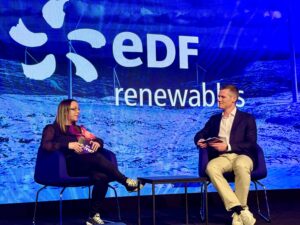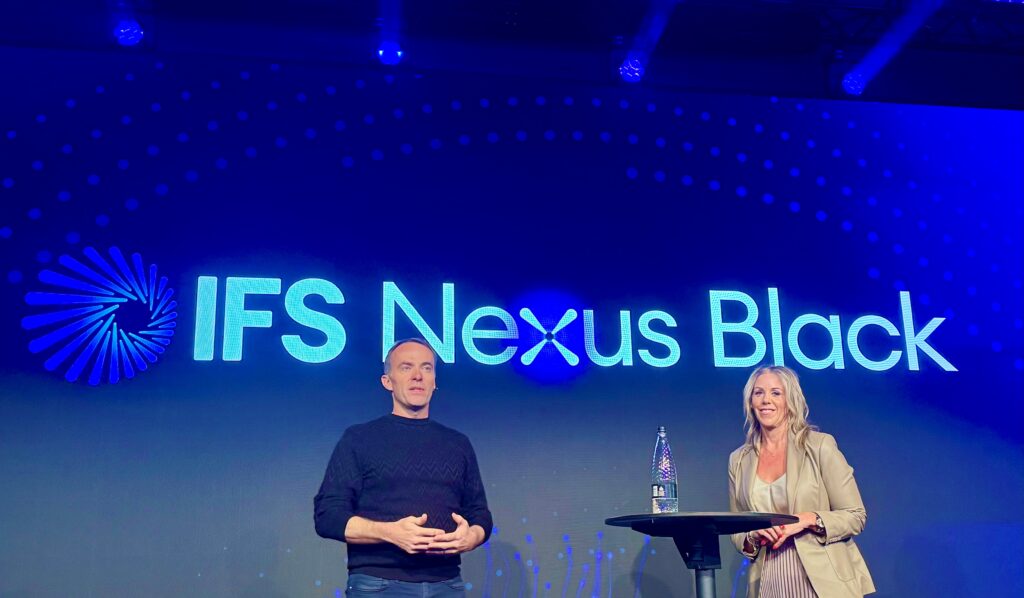 As governments and energy giants scramble to meet net zero targets, EDF Renewables is tackling the challenge with equal parts urgency and clarity. Speaking at IFS Connect UKI 2025 in Birmingham, UK, a senior leader from EDF laid out how the organization is leveraging IFS Cloud as the digital backbone of its ambitious growth strategy—aiming to produce 10 GW of clean energy annually by 2035 across wind, solar, battery storage, and green hydrogen.
As governments and energy giants scramble to meet net zero targets, EDF Renewables is tackling the challenge with equal parts urgency and clarity. Speaking at IFS Connect UKI 2025 in Birmingham, UK, a senior leader from EDF laid out how the organization is leveraging IFS Cloud as the digital backbone of its ambitious growth strategy—aiming to produce 10 GW of clean energy annually by 2035 across wind, solar, battery storage, and green hydrogen.
“We’re the most diverse renewable electricity generator in the UK and Ireland,” the EDF representative said. “And we’ve adopted IFS not just for today’s asset management—but to support our full lifecycle: from development to decommissioning.”
EDF Renewables went live with IFS Cloud just two years ago, adopting the cloud-native platform from the start. The decision was driven by an immediate need for robust asset operations functionality, but with a long-term view of platform-wide integration. Today, a third of the company’s 700+ employees use IFS daily.
What stood out during EDF’s presentation was less about flashy AI features, and more about strategic alignment. EDF emphasized how critical IFS’s culture and customer success model had been—pointing to the support received through success managers, industry user groups, and peer collaboration at global events like IFS Unleashed.
“We only know what we know,” the EDF leader noted, citing how IFS’s business value assessments helped the company revalidate implementation decisions and optimize for future scale. With plans to quintuple operations by 2035, EDF is actively reengineering workflows within IFS Cloud to ensure the platform can scale seamlessly alongside the business.
Though cautious about AI, EDF is positioning itself to take advantage of upcoming releases—starting with version 24R2. “We’re a risk-aware company,” they said. “But AI will be a game changer once we can align it with our roadmap and use cases.”
What this means for ERP Insiders
Integrate asset, capital PM and ESG management. Energy companies pursuing net zero mandates should assess whether their digital architecture is future-ready. Prioritize systems that integrate asset operations, capital project management, and ESG data in a single platform. EDF’s success shows the value of adopting IFS Cloud from the outset and leveraging the partner ecosystem, including business value assessments and advisory boards. Companies should establish a roadmap that includes version upgrades, workforce enablement, and eventual AI adoption—while resisting bolt-on sprawl. Treat ERP not as a back office enabler, but as a strategic foundation for grid modernization and renewable expansion.
IFS plays the industry-specific card again. IFS Cloud offers energy and utilities companies a unique advantage: industry-specific functionality across project-centric and asset-centric workflows, embedded in a composable, cloud-native architecture. The platform supports the full energy lifecycle—from development to decommissioning—and includes advanced planning, work order automation, ESG reporting, and grid asset visibility. EDF’s experience illustrates how IFS enables rapid operational maturity while preserving flexibility for growth. With embedded AI tools like Planning & Scheduling Optimization (PSO) and Emissions Management on the horizon, IFS is evolving from transactional ERP to an intelligent operations platform for clean energy producers.
Energy industry depth bodes well for IFS. As the global energy transition accelerates, the ERP market for utilities and renewables is projected to exceed $25 billion by 2030. Legacy ERP vendors often struggle with the agility and lifecycle-specific capabilities needed by new energy players. IFS’s sector focus, single data model, and embedded intelligence position it as a viable challenger to legacy providers like Oracle and SAP. With deep domain expertise, a growing footprint in the UK and EU, and expanding AI feature sets tailored to the field, IFS is well-positioned to become the platform of choice for renewable-first, digitally driven utilities over the next five years.




